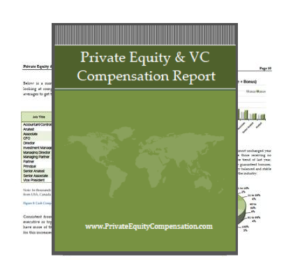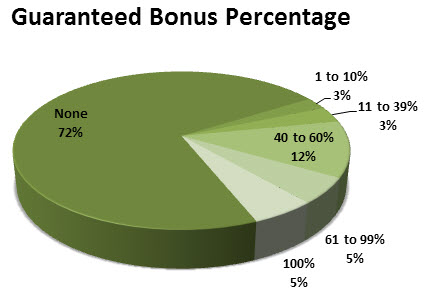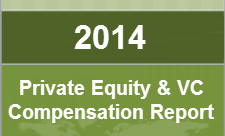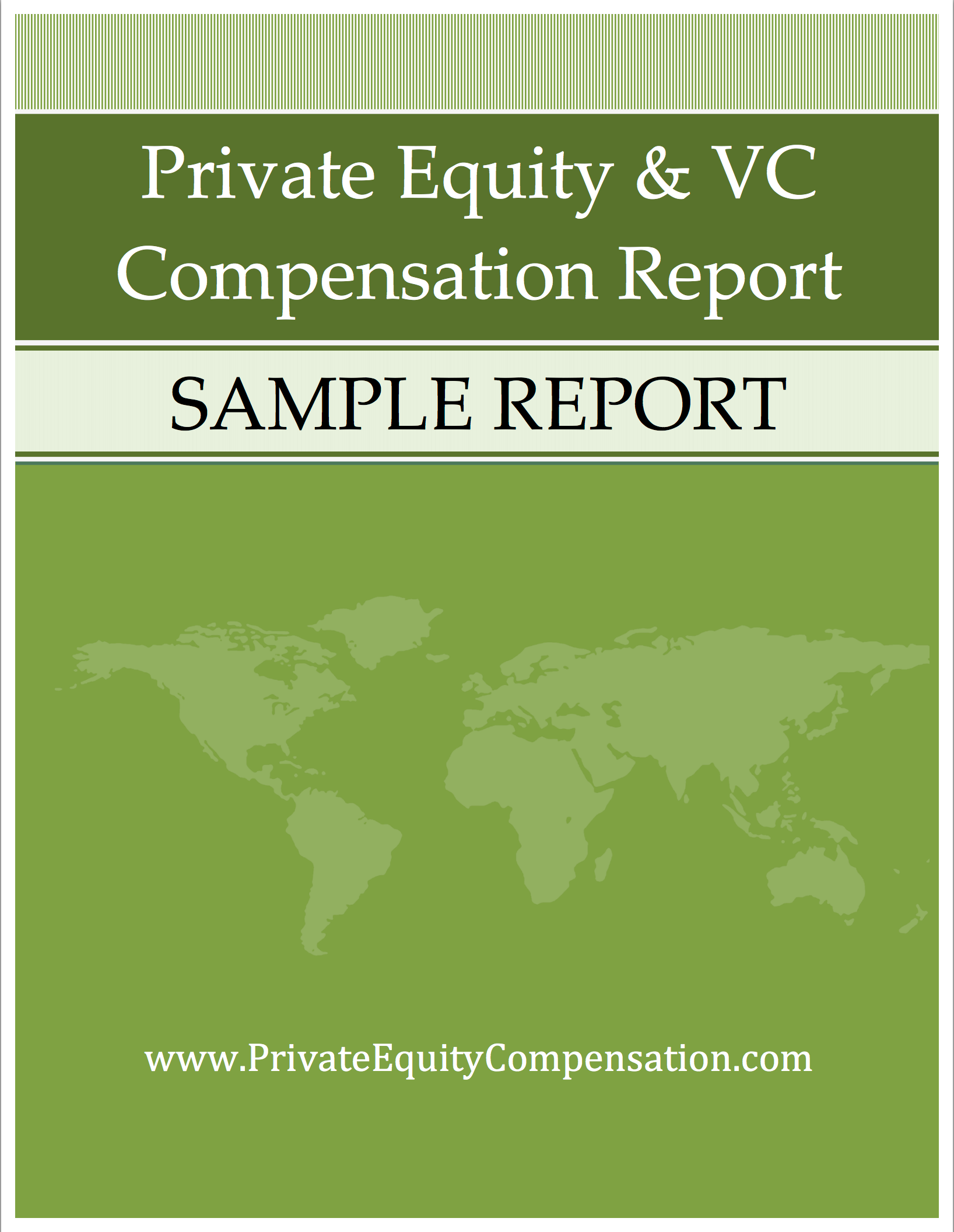Dec 5, 2022 | private equity compensation
2023 Private Equity Compensation Report Shows Increased Compensation Despite Slowing Fund Performance

ANN ARBOR, MI, December 7, 2022 – The 2023 Private Equity and Venture Capital Compensation Report marks the ninth straight year of compensation gains in the private equity and venture capital industry.
Despite a downturn in the stock market, corporate layoffs, and discussions of recession, participants across the board reported higher total earnings over the previous year. Overall, 65 percent of respondents expect to see greater cash earnings this year.
Those earning from $151,000 to $1 million increased another 3 percent and now account for 87 percent of respondents. This is the highest percentage of private equity and venture capital professionals reporting earnings of more than $150,000 in annual compensation in the history of this report.
“As we saw last year, most of these professionals are unhappy with their private equity compensation packages,” said David Kochanek, Publisher of PrivateEquityCompensation.com. “Market conditions and employee expectations were the two biggest reasons cited for their dissatisfaction.” Carried interest and compensation formulas were the remaining reasons for dissatisfaction.
Estimated fund performance in 2022 is down compared to last year. Funds up 25 percent or more fell by 4 percent. Funds up 10 to 24 percent dropped from 45 percent last year to 39 percent. And the percentage of respondents who said their fund’s performance was down increased from 4 to 8 percent. Given the state of the economy, we expect this trend to continue in 2023.
Bonus pay is usually based on several factors, including firm performance, fund performance, and individual performance. As reported in previous reports, this year, when funds didn’t perform well, professionals expected their firm to pay out lucrative bonuses to team members.
The most popular month for bonus payouts is December, accounting for 26 percent of responses. December is followed by the first three months of the year, in which 49 percent of respondents report receiving their bonus payouts.
In-house training continues to receive unfavorable reviews, with nearly half of respondents reporting non-existent or weak internal training programs. Equivalent to last year, only 18 percent rate their in-house training as good to excellent despite the benefits firms could gain in recruitment and retention by strengthening this area.
In addition to compensation data, the 2023 Private Equity and Venture Capital Compensation Report provides additional insights such as positions in demand, percentage of firms hiring, where firms are cutting back, and where career opportunities are increasing.
About The Report
The 2023 Private Equity and Venture Capital Compensation Report is based on data collected directly from hundreds of private equity and venture capital partners, principals, and employees.
The report, in its sixteenth year of publication, is widely regarded to be among the most comprehensive benchmarks for private equity and venture capital compensation. It provides independent and impartial data covering a broad range of salary, bonus, carried interest, and other compensation-related information, sourced directly from professionals working within the industry.
Dec 19, 2021 | private equity compensation
2022 Private Equity Compensation Report Shows Continued Upward Trends in Compensation

ANN ARBOR, MI – The 2022 Private Equity and Venture Capital Compensation Report shows that private equity and venture capital compensation is up again this year, marking the eighth straight year of compensation gains.
The percentage of respondents earning $150,000 and below has continued to decline and those earning from $151,000 to $1 million increased to 80 percent of respondents. This is the highest percentage of private equity and venture capital professionals reporting earnings more than $150,000 in annual compensation in the history of this report.
“Overall, compensation is up, yet 57 percent of those surveyed are dissatisfied with their pay,” said David Kochanek, Publisher of PrivateEquityCompensation.com. “We’ve seen this before. When the market is strong, pay satisfaction is weak. This is because investment professionals are not currently concerned about losing their job and they are reading about the top performers and huge pay packages.” Market conditions and employee expectations are the reasons cited by 62 percent of those dissatisfied.
Estimated fund performance in 2021 was up compared to 2020, and funds up 10 to 24 percent over last year represented the majority at 45 percent.
The research shows that bonus pay is typically calculated based on firm performance, fund performance, individual performance and a combination of factors. The largest bonus payouts are achieved in the largest firms based on individual performance. In fact, employees at the largest firms can expect to earn more than triple the bonus pay of those at smaller firms.
In addition to compensation data, the 2022 Private Equity and Venture Capital Compensation Report provides additional insights such as positions in demand, percentage of firms hiring, where firms are cutting back and where career opportunities are increasing.
About The Report
The 2022 Private Equity and Venture Capital Compensation Report is based on data collected directly from hundreds of private equity and venture capital partners, principals and employees.
The report, in its fifteenth year of publication, is widely regarded to be among the most comprehensive benchmarks for private equity and venture capital compensation. It provides independent and impartial data covering a broad range of salary, bonus, carried interest and other compensation-related information, sourced directly from professionals working within the industry.
Apr 26, 2021 | private equity compensation
Continued Upward Trend in Compensation Despite COVID-19 Pandemic

ANN ARBOR, MI, April 27, 2020 — The 2021 Private Equity and Venture Capital Compensation Report shows that private equity and venture capital compensation is up again this year, marking the seventh straight year of compensation gains. The year was unprecedented with the COVID-19 pandemic, and many respondents noted concerns about fundraising and job security in this environment.
The percentage of respondents earning less than $150,000 was down again and those earning from $150,000 to $1 million increased to 68 percent of respondents. This represents the highest percentage of private equity and venture capital professionals reporting earnings more than $150,000 in annual compensation in the history of this report.
“Overall, compensation is up, but more than half of those surveyed are dissatisfied with their pay,” said David Kochanek, Publisher of PrivateEquityCompensation.com. Market conditions and employee expectations are the reasons cited by 60 percent of those dissatisfied.
Bonus pay in the highest pay band has been declining as a percentage share of total compensation since 2014. In fact, bonus pay went down for most respondents compared to last year. However, employees at the largest firms can expect to earn more than double the bonus pay of those at smaller firms.
The research shows that private equity bonus pay is typically calculated based on a combination of several factors: firm performance, fund performance, and individual performance. The highest percentage of firms use a combination of factors but the largest bonus payouts are achieved in the largest firms based on firm performance.
For private equity job seekers, the 2021 Private Equity and Venture Capital Compensation Report provides additional detail such as positions in demand, percentage of firms hiring, where firms are cutting back and where career opportunities are increasing.
About The Report
The 2021 Private Equity and Venture Capital Compensation Report is based on data collected directly from hundreds of private equity and venture capital partners, principals and employees.
The report, in its fourteenth year of publication, is widely regarded to be among the most comprehensive benchmarks for private equity and venture capital compensation. It provides independent and impartial data covering a broad range of salary, bonus, carried interest and other compensation-related information, sourced directly from professionals working within the industry.
Dec 15, 2018 | private equity compensation
Private Equity and Venture Capital Compensation Gains Continue
 In this, our twelfth annual Private Equity & Venture Capital Compensation Report for 2019, we look to that past to better confront the challenges of the future. The goal of this report is to identify industry compensation trends and provide insights into their effect on compensation practices, recruitment and retention.
In this, our twelfth annual Private Equity & Venture Capital Compensation Report for 2019, we look to that past to better confront the challenges of the future. The goal of this report is to identify industry compensation trends and provide insights into their effect on compensation practices, recruitment and retention.
This year marks the fifth straight year of compensation gains in the private equity and venture capital industry, with 64 percent of this year’s respondents expecting total compensation levels to increase over last year, while only 5 percent expect to earn less.
We have noted several trends in this year’s compensation report, one of which is increasing base salaries and declining bonuses as a percentage of overall compensation for private equity and venture capital professionals in the highest pay band.
This year’s report confirms the continuation of another unsettling trend—the diminishing correlation between bonus pay and firm performance. For example, we see that respondents employed in firms where fund performance is down by 1 to 9 percent still forecast an average bonus of $114,000. Seeds of this trend surfaced in 2014, sprouted in 2015, grew in 2016 and matured in 2018.
In-house training continues to receive unfavorable reviews, despite last year’s movement in a positive direction. Why the industry ignores the potential benefits of robust in-house training programs remains a mystery, particularly in the competitive job market that exists today. Quality internal training programs have the potential to attract and retain talent, but statistics show this potential is broadly ignored, as a mere 17 percent of this year’s respondents rate their in-house training as good to excellent.
Higher MBA base salary, bonus compensation, and vacation time as compared to their non-MBA peers has been a regular feature of this report since its inception. This year, we can once again, confirm the monetary value of an advanced degree.
Job seekers will appreciate the section of this report devoted to identifying which positions are in demand, what percentage of firms are hiring, and what percentage are cutting back. For example, 54 percent of respondents’ firms are hiring investment personnel, while only 1 percent are cutting back in information technology hires.
The 2019 Private Equity and Venture Capital Compensation Report serves as myth-buster and forecaster, debunking misconceptions, and providing readers insightful, industry-specific information regarding the complex subject of compensation.
Other highlights from this year’s report include:
- Respondents working in firms with less than $100 million in assets under management (AUM) earn almost 13 percent less than peers in firms with $1 billion or more;
- 73 percent of respondents do not receive a bonus guarantee;
- The least-favored investment strategy is PIPE;
- Bonus pay totals 44 percent of all compensation paid to industry professionals; and
- Fifty-two percent of respondents work in firms with expected fund gains of 10 to 24 percent.
About The Private Equity Compensation Report
The 2018 Private Equity and Venture Capital Compensation Report is based on data collected directly from hundreds of private equity and venture capital partners, principals and employees.
The report, in its eleventh year of publication, is widely regarded to be among the most comprehensive benchmarks for private equity and venture capital compensation. It provides independent and impartial data covering a broad range of salary, bonus, carried interest and other compensation related information, sourced directly from professionals working within the industry.
Feb 4, 2014 | Bonuses, private equity compensation
The annual bonus is a large part of compensation in the financial industry and this holds true in both private equity and venture capital firms. Depending on a number of factors, bonuses can range from a most welcome “extra paycheck” at the end of the year to a substantial majority of a professional’s total compensation. Our 2013 Private Equity and Venture Capital Compensation Report identified several factors that influence bonuses in the industry, from fund performance to firm size and job titles. Considering all of these elements is critical when attempting to determine whether a bonus is on market or not.
One of the obvious factors that drive bonus levels in the industry is fund performance. Simply put, a firm experiencing greater success is likely to reward its employees most handsomely. This was certainly one of the leading factors in the differences between reported bonus levels. Top performing funds, earning in excess of 25 percent for their investors, rewarded employees with $151 thousand in incentives in 2012. That compares to only $11,000 being awarded to employees in firms that lost over 10 percent of their value. With a clear trend correlated with performance, it’s safe to assume that the majority of a private equity professional’s bonus will be driven by the returns the fund provides to its investors.
Another factor that weighs on the size of one’s bonus is firm size. While performance can also be somewhat correlated with firm size in some cases, it still holds that both the number of employees and the size of the firm or fund weighs heavily in how much bonus compensation an employee will receive. In general, firms that manage more assets tend to offer higher bonuses despite base compensation being largely the same between firms. On average, an employee at a firm managing $1 billion or more in assets earned a bonus of $250 thousand in 2012, while at a firm with under $200 million in assets an employee would be likely to see $100 thousand in incentive pay.
Somewhat surprising, however, is the impact of the number of firm employees on expected bonus size. The highest bonuses were seen among firms with less than 5 employees. This likely reflects the concentration of senior professionals in smaller firms and a higher reliance on results in order to sustain the very existence of the firm.
The rewarding of senior employees through higher bonus payouts was seen across the industry however, not just in small firms. For example, the average bonus of a Director was around between $100 and $130 thousand per year across all firm sizes, while an associate saw between $24 and $66 thousand. The largest bonus payouts were found in those with Partner and Managing Partner titles, with some big firm leaders earning up to $1.5 million in incentive pay in 2012. Across job titles, a clear trend is evident in that more senior employees will find a larger portion of their pay coming from incentives. This trend likely ties in to their greater influence on firm profits.
With this considered, it’s important to keep in mind all of these factors when evaluating incentive compensation. Bonuses can vary heavily based on these factors. However, performance is always the key driving factor in incentive payouts, whether that’s the performance of the fund or an individual’s own contribution. Successful results are always the best way to ensure a higher bonus payment at the end of the year.
Jan 14, 2014 | private equity compensation
The seventh annual Private Equity and Venture Capital Compensation Report, released by the consulting firm Benchmark Compensation, indicates compensation growth in the private equity and venture capital markets is slowing.
Although private equity professionals in certain roles reported increases in compensation this year, overall, the growth in cash compensation flattened from last year’s numbers. The average private equity professional worked more than 60 hours per week and earned $271,000 USD in cash compensation this year.
 When it came to compensation changes by job title, some positions outperformed others, with Managing Partners, Principals, Directors and Investment Managers seeing some of the biggest increases. In the junior ranks of the firm, analysts, senior analysts, associates and senior associates all saw fairly modest gains.
When it came to compensation changes by job title, some positions outperformed others, with Managing Partners, Principals, Directors and Investment Managers seeing some of the biggest increases. In the junior ranks of the firm, analysts, senior analysts, associates and senior associates all saw fairly modest gains.
“We were closely watching cash compensation trends in 2013 because we anticipated that the carried interest tax break was in jeopardy,” said David Kochanek, Publisher of PrivateEquityCompensation.com. “It looks like carry will live to fight another day, so we don’t think we will see any major shifts in how private equity and venture capital compensation is structured in the near term.”
Due to the correlation with position within the firm, work experience remains a leading factor in carried interest allocations. At the 6 to 9 years of experience range, the percentage of professionals participating in carry increases significantly. After 10 years in the workforce, however, the participation percentage is relatively flat.
On average, bonuses comprised 39 percent of this year’s cash compensation total and contributed more than 70 percent of cash earnings for those taking home more than $1 million.
In most cases, cash compensation increased along with the size of the fund. Those in analyst positions saw the biggest difference in cash compensation between small and large funds. Analysts at big funds, on average, earned nearly double that of their peers in smaller funds. “Although somewhat higher base salaries were in place for the analysts at larger funds, this differential was mostly bonus dependent,” said Kochanek.
About The Report
The 2014 Private Equity Compensation Report is based on an industry survey conducted in October and November 2013. Data was collected directly from hundreds of private equity and venture capital partners and employees. The full report can be purchased at http://www.PrivateEquityCompensation.com
The Report has grown to be the most comprehensive benchmark for private equity and venture capital compensation practices. Some of the participating firms over the years include: Actis, American Capital, Bain Capital, Battery Ventures, BlackRock, Carlyle, Century Capital Management, Cerberus, Comcast Ventures, DuPont Capital Management, EdgeStone Capital Partners, GE, Guggenheim Partners, Highland Capital Partners, Hilco Consumer Capital, Intel Capital, Mission Ventures, Mohr Davidow Ventures, North Atlantic Capital, RBC Capital Partners, RBS, Safeguard Scientifics, SV Life Sciences, Siemens Venture Capital, Venrock, Warburg Pincus, and Wellington Partners.



 When it came to compensation changes by job title, some positions outperformed others, with Managing Partners, Principals, Directors and Investment Managers seeing some of the biggest increases. In the junior ranks of the firm, analysts, senior analysts, associates and senior associates all saw fairly modest gains.
When it came to compensation changes by job title, some positions outperformed others, with Managing Partners, Principals, Directors and Investment Managers seeing some of the biggest increases. In the junior ranks of the firm, analysts, senior analysts, associates and senior associates all saw fairly modest gains.